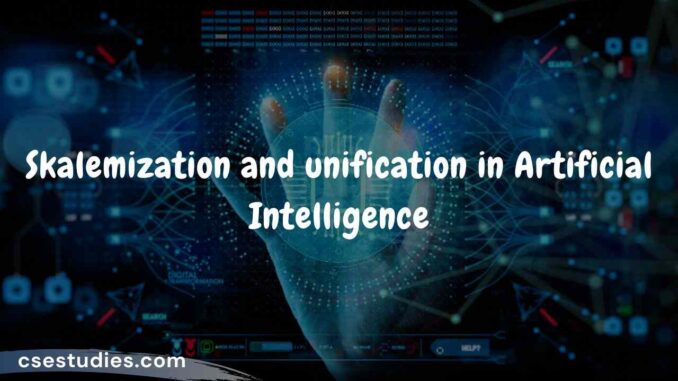
In the field of artificial intelligence and logic programming, “skolemization” and “unification” are important concepts related to logical inference and knowledge representation. Let’s understand each of them:
Skalemization in Artificial Intelligence
- Skolemization:
- Skolemization is a process used in first-order logic to eliminate existential quantifiers (∃) from logical formulas. It involves replacing existentially quantified variables with Skolem functions or Skolem constants, which are new terms introduced to make the formula quantifier-free.
- The Skolemization process ensures that every existential statement can be rewritten in a universal form, making it easier to reason about and manipulate using logical rules and inference procedures.
- Skolemization is particularly useful when translating first-order logic formulas into a form that can be processed by automated reasoning systems or theorem provers.
Unification in Artificial Intelligence
- Unification:
- Unification is a process that aims to find a common instance for variables in logical formulas or terms. It is a central operation in logic programming and plays a crucial role in resolution-based theorem proving and unification-based algorithms like Prolog.
- The goal of unification is to make two terms or predicates syntactically match by assigning values to variables such that the two expressions become identical.
- Unification involves comparing terms, resolving conflicts between variable assignments, and recursively applying the unification process to sub-terms until a unified state is achieved or until unification fails if no common instance can be found.
- Successful unification provides a substitution mapping that can be used to instantiate variables and make logical inferences.
Application of Skalemization and unification in Artificial Intelligence
- Use in AI:
- Skolemization and unification are essential in automated reasoning, theorem proving, and logical programming languages like Prolog.
- Skolemization allows for the elimination of existential quantifiers, enabling the translation of first-order logic formulas into a form that can be effectively processed by inference engines.
- Unification is utilized to match and combine terms, unify variable assignments, and instantiate variables with appropriate values during logical inference and resolution-based reasoning.
These concepts are fundamental to logical reasoning and knowledge representation in AI, enabling the manipulation, transformation, and inference of logical formulas. Skolemization and unification provide powerful techniques for handling quantifiers and finding common instances, respectively, which are crucial for automated reasoning systems and logic-based AI applications.